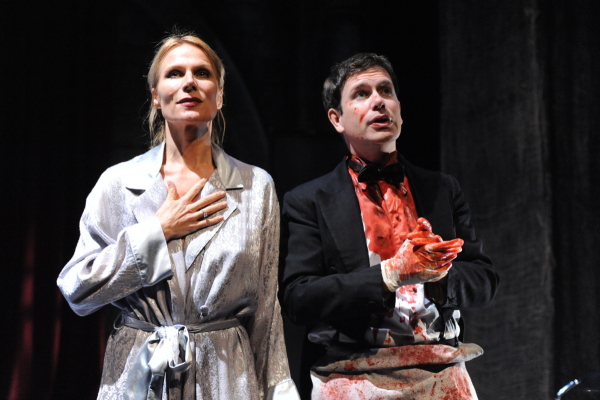Gertrude — The Cry

(© Stan Barouh)
Howard Barker's dark and disarmingly funny riff on Hamlet, Gertrude — The Cry takes the moral world of Shakespeare's play and turns it on its head. In a compelling two and a half hours, Gertrude portrays the Dane's mother not as the guilt-ridden queen of Shakespeare's play but as a sexually voracious, society-defying mastermind behind her husband's murder. First produced in London in 2002, Gertrude is now receiving its U.S. premiere at Atlantic Stage 2 in an inspired production for Potomac Theatre Project.
As in Hamlet, the play is set in Elsinore Castle and its environs, but the time has shifted to the present. Smoke fills the air, and Mark Evancho's set of gray-stone masonry creates a modern Gothic atmosphere that looks like it's just waiting for someone to die. It doesn't take long for that to happen. In the first eye-popping scene, Gertrude (a statuesque Pamela J. Gray) and Claudius (Robert Emmet Lunney) come upon the sleeping king of Denmark (Gertrude's husband and Claudius' brother). Claudius orders Gertrude to remove her clothing — "Let me see why I am killing" — then pours poison into the king's ear. Seeing her dying husband, naked Gertrude utters a primal cry that is part nauseous wretch and part orgasm, and that drives Claudius mad with desire. As the king expires, Gertrude and Claudius copulate above the corpse.
At the funeral, Gertrude's prudish, petulant son, Hamlet (David Barlow), a poster child for officious morality, finds he cannot shed tears for his father, but he has no difficulty chiding his mother for her unabashedly sexual way of dressing. Claudius' mother, Isola (Kathryn Kates), is no fan of Gertrude's sluttishness, either, so Isola tempts Gertrude into seducing the duke of Mecklenberg (Bill Army). Gertrude does so, even after learning that she is pregnant. Distraught Hamlet marries Ragusa (Meghan Leathers), a young woman whom he detests, and a series of intrigues involving Gertrude's servant, Cascan (an understated yet mesmerizing Alex Draper), leads to a pileup of bodies reminiscent of the final scene of Shakespeare's original work.
Richard Romagnoli's smart direction makes Barker's thematically complex play accessible and entertaining. It's not always clear what Barker is getting at with his enigmatic plot twists and sometimes perplexing character motivations, but Romagnoli avoids the potential pitfall of letting Barker's language take itself too seriously. His actors effectively bring out the searing comedy hidden in Barker's dark words. Though the second act tends to get a little mired in its conceits, we're permitted a little schadenfreude while watching the lives of the play's self-indulgent characters unravel.
Gray plays Gertrude with an elegant ferocity, reveling in the ecstasy of instinct. (Danielle Nieves' costumes for Gertrude, complete with stunning hats, are fabulous.) She makes an excellent foil to Barlow's whiny, infantile Hamlet, who ambles about the stage like a spoiled moppet when etiquette is breached. Lunney's brilliant Claudius gradually withers as his longing to hear Gertrude's cry again transforms him into a puling whelp. And Kates is a riot; her Isola dislikes everyone, and she sounds like your scolding nana from Brooklyn.
You may wind up feeling confused at the end of Gertrude — The Cry. The play does not hew especially close to the plot of Hamlet, in the fashion of Tom Stoppard's Rosencrantz and Guildenstern Are Dead. Instead, Barker's play freely plots its own course as he meditates on the nature of morality, which makes for some heavy Act 2 philosophizing. Still, this production offers tremendous rewards as it considers the need to shatter moral codes in order to save civilization. Gertrude's cry, in Barker's words, is "the cry of a damaged world."










